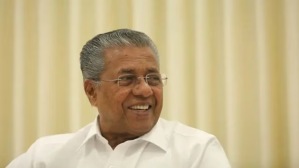Its quite clear monetary policy has to be supportive. We mustnt allow interest rates to rise
A key pivot in the core team thats steering the Indian economy through the current crisis is <b>Deputy Chairman of the Planning Commission</b> <b><font color="cc000">Montek Singh Ahluwalia</font></b>. In this interaction with <b>The Indian Express Editor-in-Chief</b> <b><font color="cc000">Shekhar Gupta</font></b> on<b> NDTV 24X7s Walk the Talk</b>,Ahluwalia talks of the Interim Budget,the unfolding government response,what the Reserve Bank of India can - and should do
amp;149;My guest this week the man whos unexpectedly in the hot seat. The Deputy Chairman of the Planning Commission is not meant to occupy the hottest of hot seats in the government. But today,Montek,a role you didnt bargain for having to be the main crisis fighter for this government?
We have a lot of crisis fighters but we are certainly part of the team that is doing what needs to be done.
amp;149;And is the team doing what needs to be done?
I think so. I mean its a very difficult situation not just for us but around the world and if you read any newspaper,you can see that.
amp;149;If there are any newspapers left to be read. Most of them are going bankrupt now.
I was just reading the Financial Times talking about Britains problems. You look at any American newspaper talking about whats happening in the US. This is a global crisis and every country is trying to meet it by deploying a multiplicity of instruments. I mean there is monetary policy,theres fiscal policy,theres confidence-building,all of that. And its clear that you know for the current year,2007-08,with the latest estimated growth of about 7.1 which the CSO has come out with8230; its clear that India is the second fastest growing country. Weve weathered these six months exceptionally well. The challenge is whats the next year going to be like.
amp;149;Isnt that a bit misleading because youve had growth in the first six months. If you look at the last two quarters of the year theyre going to be as disastrous as any other country.
No,no,because I think in the first six months if you look at GDP numbers, it came to an average of about 7.7. For the year as a whole its supposed to be about 7.1. This means that in the second half,its about 6.5 or something like that. Now 6.5,even if you said on an annualised rate8230;.
amp;149;But its a declining curve.
Yes,its still declining but that doesnt actually surprise me. Please remember that the crisis is usually dated from the middle of September when Lehman Brothers collapsed and you had a massive crisis of confidence around the world. I mean the world economy was slowing down even earlier but nobody called it a crisis. So after mid-September its been bad news for everybody and its been bad news for us. The real issue is if you take the second half of the fiscal year as 6.5,can we stabilize at 6.5 for 2009-2010? Can we through additional stimulus maybe do a little better? Those are the real challenges. And I think,in the second half,the damage that was going to be done on exports was pretty evident. So the question is: is it going to be any worse in the second. Maybe not.
amp;149;But have we done everything we could have done?
Well,first you should never claim that youve done everything. In an ideal world,maybe you could do a little bit more but lets look at what we could do. In the area of monetary policy,I think weve done a lot and I think the Reserve Bank still has room to do more. Part of the strategy of being cautious was not to shoot every bullet in the gun right at the beginning. So they actually wanted to have some reserves and they have a lot of instruments for reserves.
amp;149;So theyve got a lot of bullets left in that gun?
Yes,they do and thats part of a conscious strategy.
amp;149;So this is significant. You say they have a lot of headroom?
Absolutely,they have headroom.
amp;149;So its not like the US Fed. Where do they go now from 1 8230; .5?
No,no,were very far from that. You know,Olivier Blanchard,who is the Chief Economist of the IMF,was visiting two days ago,and I saw a news report of something he said in Mumbai. And he said the Reserve Bank has room to further cut rates if it wants to.
amp;149;Should it want to?
I would say it should be very watchful to take whatever opportunities necessary to maintain the momentum of recovery. I think the dominant concern today should be that inflation is not going to be a problem for the next six months.
amp;149;In another six weeks I think it will be unprecedented in Indias history you will have8230; youve never had inflation numbers like these.
Let me take a risk,I think that in another few weeks the inflation rate is likely to be below 4
amp;149;I think were getting to below 4.
I mean its getting there but I dont think itll actually be there and I think that it is important that you know you dont want negative growth in prices. If you get an impression that prices are going to keep falling,then people wont spend. So I mean this is what in the rest of the world they are worried about the threat of deflation. You dont want deflation. I mean anything between 4 and 5 inflation8230;.. I think you should be comfortable with and were definitely in that zone.
amp;149;Because that means we are not shoving enough money in the economy.
Yes.
amp;149;And confidence.
I dont think that will happen. Because of the fiscal deficit,the government has a very substantial amount of borrowing to do and thats a good thing. That borrowing will have to be accommodated by a supportive monetary policy. Now the way you do that,you can do a little side deal with the Reserve Bank that it picks up your securities or the Reserve Bank can pump more money into the system and then the system will pick up8230;. thats a matter of detail. It is quite clear that monetary policy has to be supportive. We mustnt allow interest rates to rise.
amp;149;If the government wants another Rs 50,000 crore,RBI just has to lower CRR by 100 basis points and that much money is in the economy.
Yes,that is certainly an instrument they can use. Both the CRR and interest rates,the policy rates are instruments available with the RBI. They have been using them and the good thing is that they have a lot of scope. So I think on the monetary side we have all the flexibility we need.
amp;149;I know you dont speak for the RBI and you should not,but do we expect the RBI,or do we hope the RBI will take a more positive,more proactive view of the situation?
I hope,as you said,they are watching this TV interview and hearing what you say.
amp;149;But theyve got you here..
Theyre very aware. And my impression from the policy pronouncements that the Governor has made,they recognise that inflation is now not a problem and I think youll see that in the next two or three weeks. They also recognise that growth is something we need to protect. Now you can draw your own conclusions,lets see how they behave.
amp;149;But do they also recognise that 10 or 12 days from now it will be all in their hands,it will be mostly in their hands because you and the Government will be bound down by the Code of Conduct?
Yes,thats absolutely correct.
amp;149;So for the next two and a half months8230;three months the only pro-active action that could take place is monetary?
No,no,let me put it this way: we will not be making new announcements announcing new projects or schemes. But one of the important things that has been done in the last three or four months is that without having to wait,during 2009,two fiscal stimulus packages were announced in quick succession. In a way,some people thought after the first fiscal stimulus,that we werent going to do anything. We were able to mobilise support8230; we did something. Weve also introduced mechanisms for providing refinance for infrastructure; you know this India Infrastructure Finance Company proposal which the Finance Minister mentioned which is now in place. It is an existing scheme on an existing system. Now these projects have to get implemented. Many of these project awards have already been made,contracts have already been given but you know8230; for example the financing has to be such that projects that have been approved get financed. That is not constrained by the Code of Conduct.
amp;149;So,the IIFCL,for example,can start dispensing its money?
Absolutely. My view is that it is a commercial operation.
amp;149;Are you talking to the banks: shed your fear8230; you are very secure in India,you are sitting on more SLR than you need?
Well,Im not,but I think the government is. Ive talked to bankers individually and I think they are very aware of it. I think its good for banks to be cautious. Most banks are now not worried about liquidity the way they were in September and October. Secondly,I think most bankers see that the government is proactive,there is a stimulus package and whats more in this vote on account we have said that in our view next year,we should have more expenditure than has been currently planned for. You know what is in the budget is already a big increase over last years Budget.
amp;149;In fact,it will become even bigger if oil prices remain low.
Which I think that they will.
amp;149;And subsidies will be even lower.
Well,were factoring in.
amp;149;We shouldnt be speculating?
Exactly. So I think from our point of view,the government has built into this years Budget and the vote on account a very substantial expenditure leeway. A lot of this money,by the way,is money that is given to state governments to implement centrally sponsored schemes. Now what we are doing is,I wrote a letter to chief ministers some time ago saying please let us know is there any flexibility in the guidelines that you need in order to be able to spend the money.
amp;149;Guidelines from the Planning Commission?
Guidelines from the Government of India8230;. we are also part of that.
amp;149;Montek the inevitable question,I know youve been asked that question before what do you think of the wide disappointment with the budget that we call a non-event,a phuus,a damp squib that gives squibs a bad name,I think our mutual friend Surjeet Bhalla said that.
Yes,its a very nice phrase,actually. I think its the first time someone has spoken up on behalf of squibs and I think thats worth recording.
amp;149;Every squib has its day.
I think I can understand that the conception is somehow that this was an opportunity which could have done something very dramatic. Now I think that one must recognise that there are parliamentary proprieties and the fact is that we are in the last stages of the government. It is normal at this time to seek a vote on account. I think it would be wrong to expect parliament to give an open ended approval without any discussion. There is no time for discussion. So we know what needs to be done. But I think what we did is first of all we put a lot of that into the stimulus packages for 2008-2009. This has greatly jacked up the planned expenditure for 2008-2009. Then we are replicating that planned expenditure with a little bit of increase for 2009-2010. So,frankly,if we were to seriously implement the initiatives that have already been identified,in the two stimulus packages for which theres a lot of money to spend.
amp;149;So you are not disappointed with this budget?
Not at all. I mean I think theres more that needs to be done for the year as a whole,but I think the government has all the instruments at its disposal between now and June
amp;149;Because even if nothing comes out of the budget,the monetary policy is free of the Code of Conduct.
Totally.
amp;149;Would you say there is harmony of thinking between the government and RBI?
I believe so. I mean if you look at what has been said by both the Governments side and the RBIs side,the central message that comes out is that we believe that inflation is now under control,we believe that growth is the bigger problem,we must do whatever is necessary to revive the growth momentum. Now were leaving them to do the details but as long as they observe that8230;.
amp;149;In fact there was a strong expectation of a rate cut on the day of the budget,that maybe was some of the disappointment of the budget.
No,no,the rate can be cut at any time. One thing I would like to point out: I dont think that right now,immediately,rate cutting is the key thing because at the moment there is quite a lot of liquidity in the system. The real concern is as government borrowing takes place,will that become a problem?
amp;149;But a rate cut or a CRR cut now would give a signal that government borrowing will not constrain the market. The bond prices will not start going up and banks will be less scared.
I think that signal,I mean I dont want to speak for the Reserve Bank,but I thought I saw several statements made by the Governor which seem to imply that the system can be managed in such a way that you should not be expecting an increase in interest rates at the moment.
amp;149;And you hope that signals will come in the days to come so rates will not go up,they should go down?
I would certainly hope so because our policy rates are very high. And the key thing is once you believe inflation has come down,and you recognise that growth is in jeopardy then there is only one direction for you to take.
amp;149;Montek,you know,now Ill say this,I remember something that you said to me so I will now choose diplomatically the right way of putting it 8230;. a lot of people say that,when you say to restore confidence that dont worry there is 7 growth people get irritated. Its like a patient who is really sick,whos got a headache and a stomach ache and a broken leg and a broken arm,he goes to the hospital and the doctor says dont worry your hearts working fine,your cholesterol is very good and the guy says,look Im in so much pain!
No,but let me say Ive never said dont worry. Ive always said that this is a major threat and a crisis. Ive always said that it is going to affect us,Ive never subscribed to the notion that everything is fine,we are decoupled8230; not at all. In fact Ive been arguing that growth will slow down and we must organise policy so that we can counter that. However,it is worth noting that with all the slowing down the economy has been managed in such a way that the overall growth rate is 7.1,and maybe,the growth rate in the second half is something of the order of 6.5.
amp;149;And this budget or non budget,I also agree that..
Interim budget8230;.
amp;149;That this interim budget had to be a non-budget,does not mean that the government has now washed its hands of the economic situation for now and said wait for the next government in May.
Let me put it this way. The only thing that has not actually happened,and is difficult to do is redefine tax rates. I dont believe and this is an important statement I think we ought to concentrate on monetary policy and we should concentrate on fiscal expansion. I dont think that tax relief is the big thing at the moment considering that weve already done quite a bit. I mean,this was the clever thing,to have got the tax reductions in the very first or second stimulus. So thats already all done. You know around the world theyll tell you tax reductions. First of all tax reductions is less of a stimulus than the same amount of money spent because some part of that is saved,and secondly in a world of uncertainty,mainly because you reduce taxes,people dont rush off and increase their expenditure. You need to deal with the issue of certainty.
amp;149;I mean you can reduce oil prices still if crude keeps moving the way its moving.
Thats not a tax rate,thats just passing on the benefits really. So I mean the problem with reducing tax rates is its very difficult to raise them again. And I think people understand a fiscal deficit which is a temporary response to a global slowdown. It is therefore credible for us to say that look,we were going to do this in the plan over the next three years so we are concentrating more of it this year and well go back to the path of fiscal responsibility.
amp;149;And you are hoping now that while the monetary policy keeps on doing whatever it should do,you are hoping that between the Election Commission and the general quality of governance,you will have the space to,as we said earlier,shove this money in the right pipes?
Im not only hoping that but I do believe that we have that space,and I think that if there are any uncertainties,Im sure that government will be talking to the Election Commission to make that quite clear. I mean any other interpretation,to say,for example,that the stimulus which has already been announcedthat the Budget which has already been presentedyou cant implement it,is like saying government should shut down. This would be,in my viewI dont believe the election commission will take that viewI would certainly be willing to argue anywhere that this would be totally wrong.
amp;149;fact the Election Commission should take a more flexible view given the level of crisis,the depth of the crisis?
Yes,thats also true,because thats why weve put in this extra amount of money and we need the flexibility otherwise the action is of no use whatsoever.
amp;149;So,Montek,I hope you get that flexibility and in our next conversation maybe in May or June we can look back on this as time and money well spent.
Lets hope so.
amp;149;You get more money than anyone in the history of this country to spend.
Well,yes,not me,but certainly a lot has been put into the Budget. And I hope it will go well.
Transcript prepared by Gayatri Verma.
- 01
- 02
- 03
- 04
- 05































